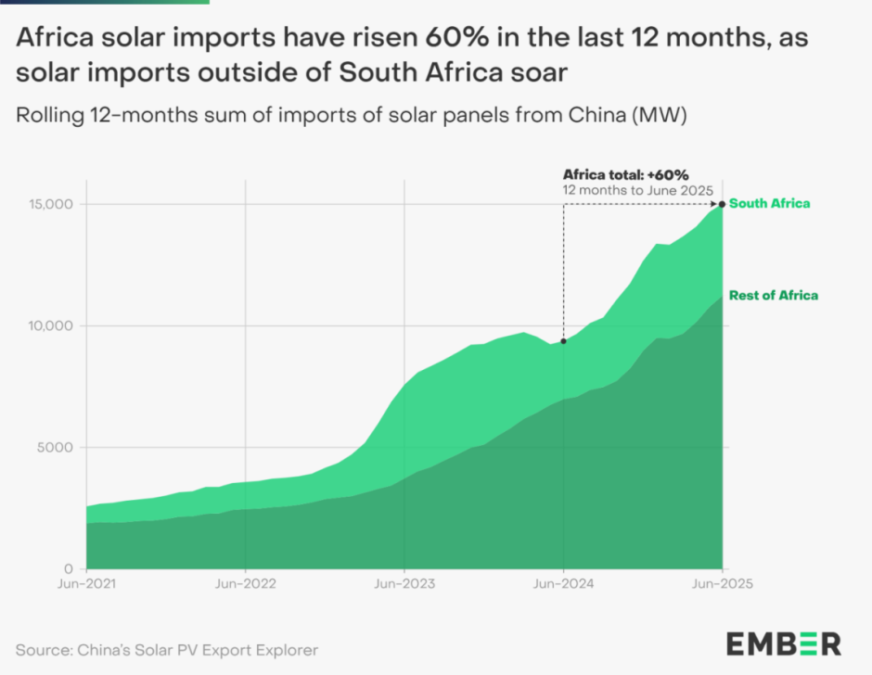Solar imports into Africa have jumped, rising 60 percent in the 12 months to June 2025, according to a new analysis from Ember. This marks the first concrete evidence of a significant solar energy take-off across the continent, reshaping Africa’s electricity industry.
Record Solar Panel Imports Across Africa
The analysis shows Africa imported 15,032 MW of solar panels in the past year, up from 9,379 MW in the previous 12 months. Unlike the last import surge in 2023, driven primarily by South Africa’s power crisis, this growth is continent-wide.
20 African countries set new records for solar panel imports.
25 countries imported at least 100 MW, up from 15 countries a year ago.
Nigeria overtook Egypt as the second-largest solar panel importer with 1,721 MW.
Algeria ranked third with 1,199 MW.
Some nations recorded exceptional growth rates: Algeria’s imports rose 33-fold, Zambia’s eightfold, Botswana’s sevenfold, and Sudan’s sixfold. Liberia, DRC, Benin, Angola, and Ethiopia more than tripled their imports.
Potential Impact on Electricity Generation
While installation data is limited, the potential contribution of these imports is substantial. If fully deployed:
Sierra Leone’s imports could generate 61 percent of its 2023 electricity output.
Chad could cover 49 percent of its 2023 electricity needs.
Liberia, Somalia, Eritrea, Togo, and Benin could see generation increase by more than 10 percent.
Overall, 16 countries could experience generation growth exceeding 5 percent.
Muhammad Mustafa Amjad, Program Director at Renewables First, emphasized the importance of tracking installations: “Bottom-up energy transitions fueled by cheap solar are no longer a choice – they’re our future. Tracking these additions is what makes the difference between a messy shift and an organized, accelerated one.”
Solar Imports Could Reduce Fossil Fuel Dependency
The report highlights that solar panels are not just expanding electricity access—they are also cutting costs. In Nigeria, the savings from replacing diesel with solar could repay panel costs within six months, with even faster payback in other countries. For nine of the top ten solar-importing countries, the import cost of refined petroleum still exceeds solar imports by 30 to 107 times, illustrating the economic potential of shifting to solar energy.
Need for More Data and Research
Despite the surge, comprehensive data on solar deployment remains limited. Ember’s Chief Analyst, Dave Jones, said: “The take-off of solar in Africa is a pivotal moment. Stronger research, analysis, and reporting are urgently needed to ensure Africa’s cheapest electricity source reaches its full potential.”
While Africa’s solar boom is still in early stages, the first signs of a major transition are visible. Learning from global precedents, such as Pakistan’s recent solar expansion, could help African nations accelerate their energy transition efficiently.
Baburajan Kizhakedath

